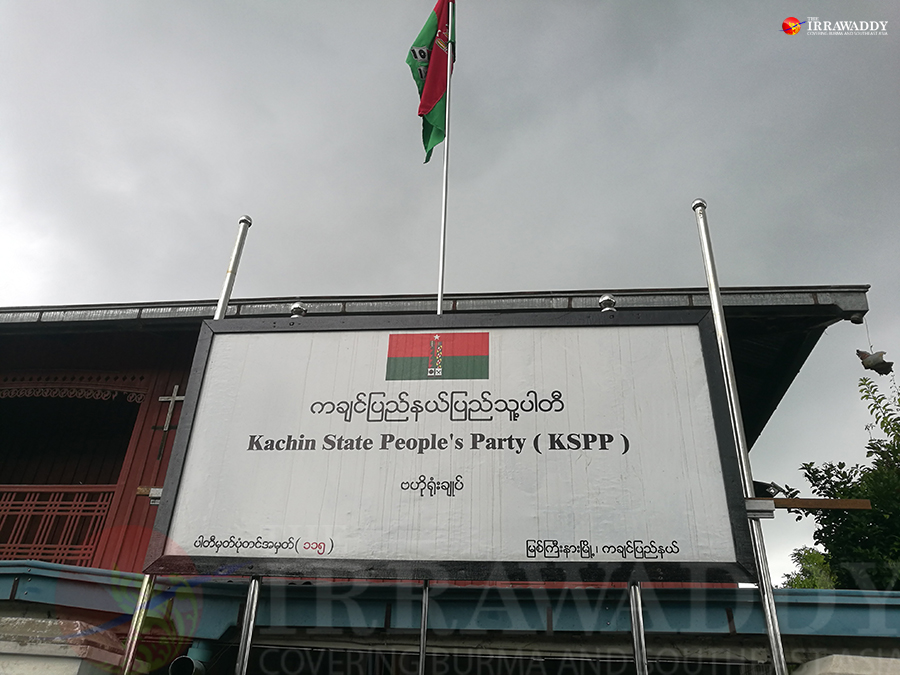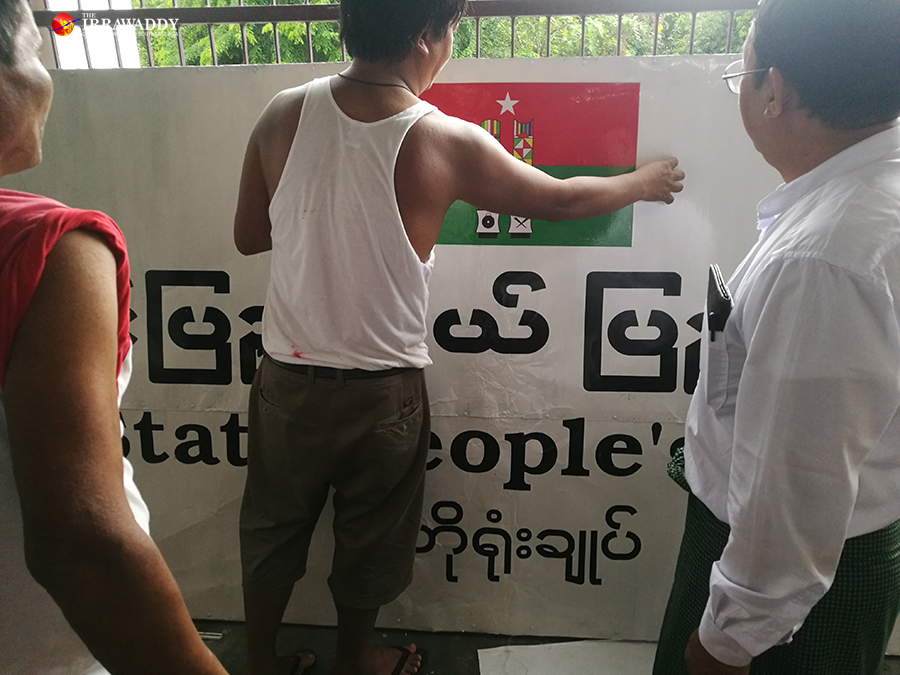The Kachin Democratic Party, Kachin State Democracy Party and Unity and Democracy Party of Kachin State merged to form the Kachin State People’s Party (KSPP) in August.
KSPP chairman Dr. Manam Tu Ja recently met The Irrawaddy’s senior editor Ye Ni and senior reporter Nan Lwin Hnin Pwint and talked about Myanmar’s peace process, resources in Kachin State, the KSPP’s hopes and preparation for the 2020 general election.
What is your assessment of the situation of peace in Kachin State as you have been involved in the government’s peace process?
There have been no clashes since the Tatmadaw [military] declared a unilateral ceasefire [in December 2018]. But we are far from achieving a permanent ceasefire. For the time being, the Tatmadaw and the National Reconciliation and Peace Center [NRPC] are trying to sign a bilateral ceasefire agreement with the Kachin Independence Army [KIA]. They are still negotiating and I think there are good prospects.
We have heard that some internally displaced people (IDPs) have started to return to their homes. Do you think there will be further good news?
Yes. The Tatmadaw, the government and the Kachin Independence Organization [the political wing of the KIA], along with religious and community leaders are working together to carry out a resettlement program. The KIA attaches great importance to the issue of IDPs and has a policy regarding their return and resettlement. But the process has been slow because there is not yet a firm bilateral ceasefire agreement between the KIA and the Tatmadaw. But I believe the IDPs will be able to return home permanently.
It is unacceptable if they have to flee again after they have returned home. I believe leaders have developed the program with genuine sympathy for the IDPs. I believe the program will be successful over time.

But the Tatmadaw is clashing with the three other groups – the Arakan Army (AA), Myanmar National Democratic Alliance Army (MNDAA) and Ta’ang National Liberation Army (TNLA) – in the Northern Alliance, in which the KIA is a member. So does this impede the KIA’s signing of a bilateral ceasefire agreement with the Tatmadaw?
Yes, it disrupts it a little bit. The government had agreed to bilateral ceasefire agreements with all four groups. But there has been little progress in negotiations. Meanwhile, fresh clashes have erupted. So everyone is concerned. As they have dedicated themselves to signing bilateral ceasefire agreements, I believe there will be success in the end.
There has been no problem between the KIO and the Tatmadaw in the meantime. So the two can sign it if they want. The two can meet anywhere. But it is different for the three other groups. As the KIO is a member of the Northern Alliance, this hampers the KIO’s signing of a ceasefire agreement with the Tatmadaw.
The peace process was initiated under former president U Thein Sein’s government and continues under the National League for Democracy (NLD) administration. The NLD’s term ends in 2020. So what are the prospects for peace before the 2020 general election?
The NLD government plans to hold another round of the 21st-century Panglong Peace Conference before the end of this year. But it is unlikely in reality. Some signatory groups to the Nationwide Ceasefire Agreement [NCA], the KNU [Karen National Union] and the RCSS [Restoration Council of Shan State], have previously withdrawn from talks with the government. But as they have resumed talks, there is a reasonable prospect that they will attend the peace conference.
On the other hand, there is also a view that the conference will be successful only when it is all-inclusive. Here comes the question of the Northern Alliance. They have not yet signed the NCA and it is not clear if they will be allowed to participate in the conference without signing the bilateral ceasefire agreement.
So if negotiations are held and an agreement is reached, the conference may be held around the end of this year. But if it cannot be held early next year, it will be more difficult to hold the conference as the general election is approaching.
Three Kachin parties have merged to form the KSPP. As the chairman of the KSPP, how have you prepared for the 2020 general election?
We will try to secure as many seats as we can in the Kachin State parliament. We are trying to gain a share if a coalition government is formed. We will work to win public trust. Without public trust and support, we cannot achieve success.
As we have merged according to the wishes of the people, they support us. We have, however, yet to try hard to improve our strategy to win public trust. We will be an honest party, and we won’t buy votes. Our party slogan is to serve the people.
We will try to win the majority of seats in the Kachin State parliament.
If Article 261(b) of the 2008 Constitution [which allows the central government to select regional and state chief ministers] can be amended, we will try to appoint the chief minister from our party.

In recent by-elections, there was vote-splitting between candidates of the Kachin parties and the NLD and, as a result, the Union Solidarity and Development Party (USDP) won some Kachin seats. Are you concerned that such a thing will happen in the 2020 election?
We have to win. Our party must win against both parties. This is our political conviction.
Regarding the amendment of Article 261, there are concerns that the amendment will give the military influence over regional and state parliaments besides the Union Parliament.
I am not concerned about that. Giving various excuses to avoid amending it amounts to disrespect for democracy. So just amend it. Even if there is the problem of 25 percent of military lawmakers [as the amendment will allow them to take part in the vote for the election of chief ministers in regions and states], we can appoint our chief minister if we win the majority.
What is important is to win a majority. We believe we can. So we are not concerned about the 25 percent. What we are concerned about is Article 261 will not be amended.
As people of various ethnic groups reside in Kachin State, what can you offer to win the votes of multi-ethnic voters?
Our party is concerned with all the people in Kachin State. If they are convinced that we will serve the interests of Kachin State, then they will vote for us. If we can adopt inclusive policies and tactics, I am confident that they will vote for us.

The USDP is working to ally with ethnic parties, with the promise to offer the chief minister position if they win. What is your stance if the USDP proposes forming an alliance with your party?
We heard about that. We will work in harmony with the big parties. We will cooperate with them where it is possible and work separately where it is not. Maybe the USDP has made that proposal out of goodwill. And it is also possible that it is an incentive used to win our support. We will wait and see if it is real or not.
With which parties does the KSPP plan to forge an alliance?
We will maintain friendly ties with both big parties and other ethnic parties. We will engage with them. But I have not yet thought about forging an alliance with them. We have no policy for that so far.
It is a widely held view that power-sharing and resource-sharing are important both in the peace process and establishment of a federal Union. As Kachin State is rich in resources, when do you think the central government will share power and resources with the state government?
This will happen only after the system is changed. Now the country is a unitary state. Power-sharing and resource-sharing cannot be done in a unitary state. Discussions on power-sharing and resource-sharing at the 21st-century Panglong peace conferences have stalled. After the country switches to a federal democracy, there will be power-sharing and resource-sharing.
But we cannot just wait for that to happen. We have to take the initiative now. We will be able to build a federal democracy one day if we take pragmatic steps.
People from Tanai, which is rich in gems and jade, have had to flee due to clashes. They cannot return home and they never see profits from the resources in their own region. What is the party’s stance regarding the rights of residents to resources?
There is no rule of law due to ongoing clashes. If we have peace and the rule of law, they will have rights. This will continue to happen, as there is still no stability.
How would you define peace?
Some people think the ceasefire is peace. It is not. A ceasefire only brings about stability but not peace. You don’t achieve peace unless you really feel it in your heart and mind. We will be able to live at ease only when we get our political rights.
The ceasefire on its own cannot be called peace. The definition of peace is that people should be able to feel both physically and mentally that peace and freedom exist. Only after systems and policies are changed to ensure equality will genuine peace be achieved.
The main problems are political. The problem is about the need to change the administrative system of the country. Then peace will be achieved.
You may also like these stories:
Myanmar’s Ethnic Parties Dismiss NLD’s Ethnic Affairs Committee as Pre-Election Ploy
Myanmar Military Abandons Truce, Citing EAOs’ Lack of Interest in Peace
How Myanmar’s Military Chief Could Become President
Karen Martyrs’ Day Case Shows Ethnic Rights in Retreat Under Present Myanmar Govt

















